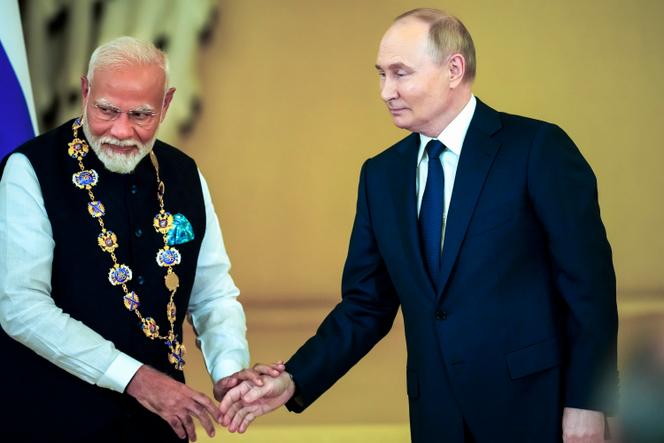


The shadow of war in Ukraine hung over Narendra Modi's entire visit to Russia on July 8 and 9. The Indian prime minister arrived in Moscow on Monday to strengthen ties with Russia, just hours after Russian air strikes on Ukrainian cities killed more than 40 people. The country's largest pediatric hospital was hit, sparking international outrage. The contrast between the images was striking. On one side, injured children were being pulled from the rubble. On the other, the Russian president, Vladimir Putin, and the Indian prime minister, Narendra Modi, were riding in a golf cart and embracing fraternally.
Since the beginning of the conflict in Ukraine, the Indian leader, a historic ally of Moscow and partner of the West, has been conducting a delicate balancing act made even more perilous by the Russian strikes that hit Kyiv on Monday. New Delhi, which defends its "multi-alignment" diplomacy strategy, has always refrained from explicitly condemning Russian aggression while calling for peace and dialogue. After the embrace, Modi reiterated this stance to his "friend" Putin on Tuesday by stating that "war cannot solve problems." "Solutions and peace talks cannot succeed amid bombs, guns and bullets," the Hindu nationalist said while pleading for "a path to peace through dialogue."
Until now, India had been very cautious in its relations with the Kremlin. To avoid offending his Western partners, Modi had avoided visiting Russia. The Indian prime minister had only met Putin once, on the sidelines of the Shanghai Cooperation Organization summit in 2022, where he had informed him that "this is not the time for war." "Everyone understands the economic rationale behind India's desire to maintain good relations with Russia," said Nicolas Blarel, professor of international relations at Leiden University in the Netherlands. India depends on Moscow for the maintenance of its military equipment, 60% of which is of Russian and Soviet origin. Since the beginning of the war, India, a major importer of over 80% of its supplies, has been purchasing large quantities of inexpensive Russian oil. Indian refiners further process some of this oil and then resell it in Europe.
At a time when the West is seeking to isolate Russia on the international stage, the Indian prime minister openly expressed his support for his Russian partner. On his arrival in Moscow on Monday, he met Putin in person at his dacha (a small country estate, or second home) in Novo-Ogaryovo, near the Russian capital. The Russian president presented him with the prestigious Order of Saint-André, Russia's highest civilian honor. As is his custom with world leaders, Modi hugged Putin. The two leaders chose to showcase their good relations during the opening of the NATO summit in Washington on Tuesday, July 9. A spokesperson for the US State Department said on Monday that the US has made its "concerns" about India's relations with Russia "very clear and direct" to India.
You have 39.51% of this article left to read. The rest is for subscribers only.
